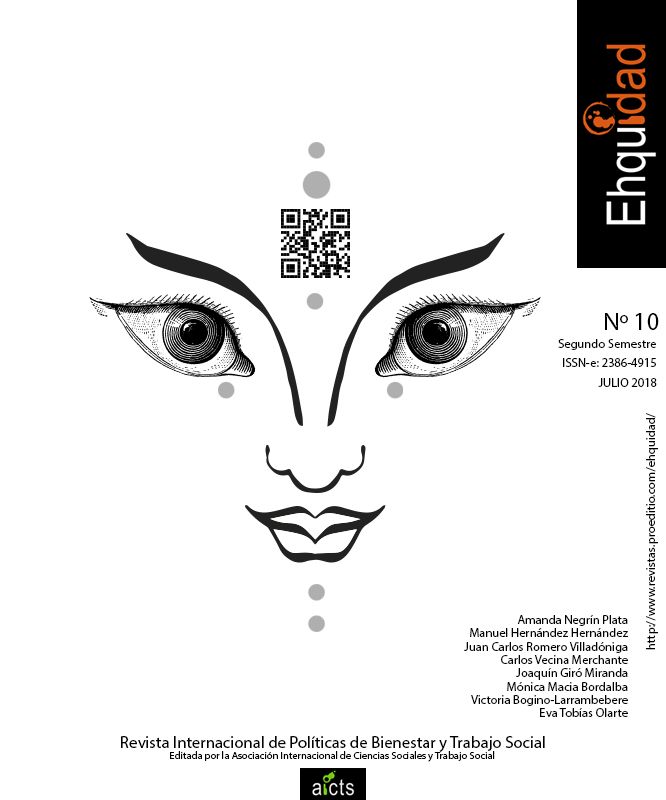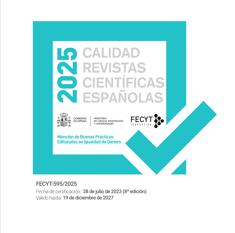A theoretical approach to family-school communication: Strategies for improvement
DOI:
https://doi.org/10.15257/ehquidad.2018.0010Keywords:
Parent school relationship, Communication strategies, Elementary education, Educational improvementAbstract
The effective communication between parents and teachers is essential to foster an understanding between both agents and to ensure greater educational success. This article presents, following the structure of the 6W of journalism (what, who, where, how, when and why), the concepts and ideas that must be placed in the structural core of family-school communication. Specifically, the aim of this paper is to show the essential strategic guidelines that schools should follow for optimizing their communication with families and to provide teachers with the necessary tools to design a communication plan according to their characteristics and necessities.Downloads
References
Anderson, K., y Minke, K. (2007). Parent involvement in education: toward an understanding of parents’ decision making. The Journal of Educational Research, 100(5), 311-323. DOI: https://doi.org/10.3200/JOER.100.5.311-323
Arnold, D., Zeljo, A., y Doctoroff, G. (2008). Parent involvement in preschool: predictors and the relation of involvement to preliteracy development. School Psychology Review, 37(1), 74-90.
Bacigalupa, C. (2016). Partnering with families through photo collages. Early Childhood Education Journal, 44(4), 317-323. DOI: https://doi.org/10.1007/s10643-015-0724-3
Bardroff, L., y Tan, J. (2012). Improving parent involvement in secondary schools through communication technology. Journal of Literacy and Technology, 13(1), 30-54. Recuperado de https://goo.gl/UuENVR
Barnyak, N.C., y McNelly, T. (2009). An urban school district’s parent involvement: A study of teachers’ and administrators’ beliefs and practices. The School Community Journal, 19(1), 33-58. Recuperado de https://goo.gl/7JgniY
Blau, I., y Hameiri, M. (2012). Teacher-families online interactions and gender differences in parental involvement through school data system: Do mothers want to know more than fathers about their children? Computers & Education, 59(2), 701-709. DOI: https://doi.org/10.1016/j.compedu.2012.03.012
Bolívar, A. (2006). Familia y escuela: dos mundos llamados a trabajar en común. Revista de Educación, 339, 119-146. Recuperado de https://goo.gl/AQdL6E
Cary, A. (2006). How strong communication contributes to student and school success: parent and family involvement. Maryland, US: National School Public Relations Association. Recuperado de https://goo.gl/Dd7AX3
Daniel, G. (2016). Parents’ experiences of teacher outreach in the early years of schooling. Asia Pacific Journal of Education, 36(4), 559-569. doi: https://doi.org/10.1080/02188791.2015.1005051
Draft, R., y Lengel, R. (1986). Organizational Information Requirements, Media Richness and Structural Design. Management Science, 32(5), 554-571. Recuperado de https://goo.gl/GSsfot
DePlanty, J., Coulter-Kern, R., y Duchane, K.A (2007). Perceptions of parent involvement in academic achievement. The Journal of Educational Research, 100(6), 361-368. DOI: https://doi.org/10.3200/JOER.100.6.361-368
Epstein, J., y Salinas, K.C. (2004). Partnering with families and comunities. Educational Leadership, 61(8), 12-18. Recuperado de https://goo.gl/8SeDKA
Epstein, J., y Sheldon, S. (2002). Present and accounted for: Improving student attendance through family and community involvement. The Journal of Educational Research, 95(5), 308-318. DOI: https://doi.org/10.1080/00220670209596604
Fan, W., y Williams, C.M (2010). The effects of parental involvement on students’ academic self-efficacy, engagement and intrinsic motivation. Educational Psychology, 30(1), 53-74. DOI: http://doi.org/10.1080/01443410903353302
García, M.P., Gomariz, M.A., Hernández, M.A., y Parra, J. (2010). La comunicación entre la familia y el centro educativo, desde la percepción de los padres y madres de alumnos. Educatio Siglo XX1, 28(1), 157-188. Recuperado de https://goo.gl/dUmusN
Garreta, J. (2008). La participación de las familias en la escuela pública. Las Asociaciones de Madres y Padres del Alumnado. Madrid, España: CEAPA. Recuperado de https://goo.gl/7WqHEd
Garreta, J. (2012). Famílies i escoles. La participació de les famílies als centres educatius. Lleida, España: Institut Municipal d’Educació. Recuperado de https://goo.gl/8Rn5cc
Garreta, J. (2015). La comunicación familia-escuela en Educación Infantil y Primaria. Revista de la Asociación de Sociología de la Educación, 8(1), 71-85. Recuperado de https://goo.gl/D9vqf1
Garreta, J., y Macia, M. (2017). La comunicación família-escuela. En: J. Garreta (coord.), Familias y escuelas. Discursos y prácticas sobre la participación en la escuela (pp.71-98). Madrid, España: Pirámide.
Graham-Clay, S. (2005). Communicating with parents: strategies for teachers. The School Community Journal, 15(1), 117-130. Recuperado de https://goo.gl/8aZSja
Heath, D., Maghrabi, R., y Carr, N. (2015). Implications of Information and Communication Technologies (ICT) for school-home communication. Journal of Information Technology Education: Research, 14, 363-396. Recuperado de https://goo.gl/rYtU5m
Henderson, A.T., y Mapp, K.L. (2002). A new wave of evidence: The impact of school, family and community connections on student achievement. Austin, Texas: Southwest Educational Development Laboratory. Recuperado de https://goo.gl/arFk1Z
Ho, L.H., Hung, C.L., y Chen, H.C. (2013). Using theoretical models to examine the acceptance behavior of mobile phone messaging to enhance parent-teacher interactions. Computers & Education, 61, 105-114. doi: https://doi.org/10.1016/j.compedu.2012.09.009
Hoover-Dempsey, K., y Sandler, H. (1997). Why do parents become involved in their children’s education? Review of Educational Research, 67(1), 3-42. DOI: https://doi.org/10.2307/1170618
Hughes, M., y Greenhough, P. (2006). Boxes, bags and videotape: enhancing home-school communication through knowledge exchange activities. Educational Review, 58(4), 471-487.doi: https://doi.org/10.1080/ 00131910600971958
Jeynes, W. (2015). A meta-analysis: The relationship between father involvement and student academic achievement. Urban Education, 50(4), 387-423. doi: https://doi.org/10.1177/0042085914525789
Knopf, H., y Swick, K. (2007). How parents feel about their child’s teacher/school: Implications for early childhood professionals. Early Childhood Education Journal, 34(4), 291-296. doi: https://doi.org/10.1007/s10643-006-0119-6
Kraft, M.A., y Dougherty, S.M. (2013). The effect of teacher-family communication on student engagement: evidence from a randomized field experiment. Journal of Research on Educational Effectiveness, 6(3), 199-222. DOI: https://doi.org/10.1080/19345747.2012.743636
López, I., Ridao, P., y Sánchez, J. (2004). Las familias y las escuelas: una reflexión acerca de entornos educativos compartidos. Revista de Educación, 334, 143-163. Recuperado de https://goo.gl/NcBxUE
Love, F. (1996). Communicating with parents: what beginning teachers can do. College Student Journal, 30(4), 440-444.
Macia, M. (2016). La comunicación familia-escuela: el uso de las TIC en los centros de primaria. Revista Electrónica Interuniversitaria de Formación del Profesorado, 19(1), 73-83.
Macia, M., y Garreta, J. (2018). Accesibilidad y alfabetización digital: barreras para la integración de las TIC en la comunicación familia/escuela. Revista de Investigación Educativa, 36(1), 239-257. DOI: https://doi.org/10.6018/rie.36.1.290111
Manhey, M., y Salmerón, H. (2016). Evaluación de la participación familiar en el currículo de la educación en los jardines infantiles y salas cuna de Chile. Profesorado. Revista de Currículum y Formación de Profesorado, 20(3), 583-625. Recuperado de https://goo.gl/JhA3s6
Martin, M., y Gairín, J. (2007). La participación de las familias en la educación: un tema por resolver. Bordón. Revista de Pedagogía, 59(1), 113-151. Recuperado de https://goo.gl/1Zk7We
Mehrabian, A. (1972). Nonverbal communication. Chicago, IL: AldineTransaction.
Metcalf, L. (2002). The parent conference: An opportunity for requesting parental collaboration. Canadian Journal of School Psychology, 17(1), 17-25. DOI: https://doi.org/10.1177/082957350201700103
Moliner, O., Traver, J.A., Ruiz, M.P., y Segarra, T. (2016). Estrategias que inciden en los procesos de democratización de la escuela. Una aproximación teórica. Revista Electrónica de Investigación Educativa, 18(2), 116-129. Recuperado de https://goo.gl/DfStZz
Murray, E., McFarland-Piazza, L., y Harrison, L.J. (2015). Changing patterns of parent-teacher communication and parent involvement from preschool to school. Early Child Development and Care, 185(7), 1031-1052. doi: https://doi.org/10.1080/03004430.2014.975223
Nespor, J. (1987). The role of beliefs in the practice of teaching. Journal of Curriculum Studies, 19(4), 317-328. doi: https://doi.org/10.1080/0022027870190403
Niia, A., Almqvist, L., Brunnberg, E., y Granlund, M. (2015). Student participation and parental involvement in relation to academic achievement. Scandinavian Journal of Educational Research, 59(3), 297-315. doi: https://doi.org/10.1080/00313831.2014.904421
Olmstead, C. (2013). Using technology to increase parent involvement in schools. TechTrends, 57(6), 28-37. DOI: https://doi.org/10.1007/s11528-013-0699-0
Pajares, M.F. (1992). Teachers' beliefs and educational research: Cleaning up a messy construct. Review of Educational Research, 62(3), 307-332. doi: https://doi.org/10.3102/00346543062003307
Palomares, A. (2015). Análisis de modelos de comunicación, profesorado-familia, para gestionar conflictos: Estudio de la comunidad educativa de Albacete. Pedagogía Social. Revista Interuniversitaria, 25, 277-298. doi: https://doi.org/10.7179/PSRI_2015.25.12
Palts, K., y Harro-Loit, H. (2015). Parent-teacher communication patterns concerning activity and positive-negative attitudes. Trames, 19(2), 139-154. doi: https://doi.org/10.3176/tr.2015.2.03
Park, S., y Holloway, S.D. (2017). The effects of school-based parental involvement on academic achievement at the child and elementary school level: A longitudinal study. The Journal of Educational Research, 110(1), 1-16. doi: https://doi.org/10.1080/00220671.2015.1016600
Pérez Juste, R. (2006). La educación de calidad: una responsabilidad compartida. Participación educativa, 1, 27-34. Recuperado de https://goo.gl/REujvE
Rivas, S., y Ugarte, C. (2014). Formación docente y cultura participativa del centro educativo: claves para favorecer la participación familia-escuela. Estudios sobre educación, 27, 153-168. doi: https://doi.org/10.15581/004.27.153-168
Rogers, R.H., y Wright, V.H. (2008). Assessing technology’s role in communication between parents and middle schools. Electronic Journal for the Integration of Technology in Education, 7, 36-58. Recuperado de https://goo.gl/gC3ohR
Rokeach., M. (1968). Beliefs, attitudes, and values: A theory of organization and change. San Francisco, CA: Jossey-Bass.
Ruiz, M.C. (2007). La participación, vía de encuentro entre padres y centro educativo. Participación Educativa, 4, 54-59.
Ruiz, M.C., y Mérida, R. (2016). Promover la inclusión de las familias a través del desarrollo de Proyectos de Trabajo. Un estudio de caso. Revista Complutense de Educación, 27(3), 943-961. doi: https://doi.org/10.5209/rev_RCED.2016.v27.n3.47022
Sarramona, J., y Rodríguez, T. (2010). Participación y calidad de la educación. Aula Abierta, 38(1), 3-14. Recuperado de https://goo.gl/T1k639
Shirvani, H. (2007). Effects of teacher communication on parents’ attitudes and their children’s behaviors at schools. Education, 128(1), 34-47.
Swick, K. (2003). Communication concepts for strengthening family-school-community partnerships. Early Childhood Education Journal, 30(4), 275-280. DOI: https://doi.org/10.1023/A:1023399910668
Thompson, B. (2008). Characteristics of parent-teacher e-mail communication. Communication Education, 57(2), 201-223. doi: https://doi.org/10.1080/03634520701852050
Thompson, B., y Mazer, J. (2012). Development of the Parental Academic Support Scale: Frequency, importance and modes of communication. Communication Education, 61(2), 131-160. doi: https://doi.org/10.1080/03634523.2012.657207
Thompson, B., Mazer, J., y Grady, E.F. (2015). The changing nature of parent-teacher communication: Mode selection in the smartphone era. Communication Education, 64(2), 187-207. doi: https://doi.org/10.1080/03634523.2015.1014382
Valdés, A.A., Martín, M., y Sánchez, P.A. (2009). Participación de los padres de alumnos de educación primaria en las actividades académicas de sus hijos. Revista Electrónica de Investigación Educativa, 11(1), 1-15. Recuperado de https://goo.gl/ErGjr3
Valdés, A.A., y Sánchez, P.A. (2016). Las creencias de los docentes acerca de la participación familiar en la educación. Revista Electrónica de Investigación Educativa, 18(2), 105-115. Recuperado de https://goo.gl/ykuTcv
Vingut, M.A., y Bertran, M. (2015). Educación infantil y familias inmigrantes: posibilidades y limitaciones comunicativas. Rivista Italiana di Educazione Familiare, 1, 33-51. doi: https://doi.org/10.13128/RIEF-16382












